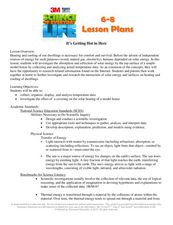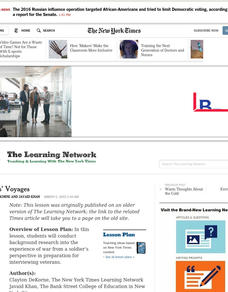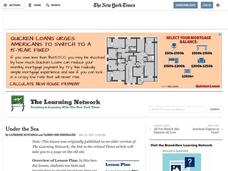Curated OER
The Lightning Thief: During Reading Strategy
After reading up to page 371 of Percy Jackson and The Olympians: The Lightning Thief by Rick Riordan, get insight into how Percy felt making a major decision through active discussion strategies that enable both academic...
02 x 02 Worksheets
Inverse Variation
Discover an inverse variation pattern. A simple lesson plan design allows learners to explore a nonlinear pattern. Scholars analyze a distance, speed, and time relationship through tables and graphs. Eventually, they write an equation to...
Curated OER
TOTAL LITERATURE SERIES
Fifth graders listen and react to the book Number the Stars, by Lois Lowry. They write in their journals every day approximately one page or more as a reflection on the reading.
Curated OER
Who Am I?
Students create a graphic timeline depicting who they are, where they've been and where they think they are going in their lives. They analyze and reflect upon the important events of their lives, and then use this as a starting point...
Curated OER
Acts of Defiance?
Learners contemplate, discuss and share responses to critical and analytical questions regarding impending war in Iraq. They write persuasive essays arguing the pros and cons of the United States waging war unilaterally.
Curated OER
A Critical Role
Students read a New York Times review of the Museum of the African Diaspora in San Francisco. They discuss the roles and responsibilities of a cultural critic, and prepare for a visit to a local museum in order to write their own reviews.
Curated OER
Feeding the Soul
Students share memories of a special meal. They research, write and peer edit a newspaper column about a favorite food associated with Thanksgiving (or other holiday or celebration).
Curated OER
Writing about Internal & External Conflicts in Lois Lowry's The Giver
Seventh graders examine the internal and external conflicts that Jonas faces in "The Giver" in an essay. Students use SMART Board and Inspiration to organize their ideas graphically before combining them into their paper.
Curated OER
Recurring Nightmares
Does history really repeat itself? Encourage your middle and high schoolers to answer this age-old question by reading the attached articles on the Cuban Missile Crisis of 1962 and the Iraq Crisis of 2002. How similar or different are...
Curated OER
Unforgettable...
Middle and high schoolers remember their most memorable experiences, and then connect their own narrative with an exposition about the topic associated with their experience. This New York Times lesson would be a great addition to...
Curated OER
Short and Sweet Science
Readers learn how to summarize scientific text and evaluate the advantages, disadvantages, and challenges in writing summaries. They select science-related articles you've pulled and collected from the New York Times and, with a partner,...
Curated OER
Organ Music
Middle and high schoolers solve a riddle about the appendix, and explore the paradox surrounding this organ. They research other human body organs to create a paper model of the human body, and write riddles highlighting identifying...
Curated OER
Lewis and Clark
Students investigate Lewis and Clark. In this Lewis and Clark lesson, students search the Internet for information about Lewis and Clark and the Corps of Discovery. Students use maps to understand the explorations and decide which...
Curated OER
Keep Heritage Alive
Youngsters share ideas about cultural and/or spiritual rituals by participating in a fishbowl discussion, which explores the ways rituals have changed over time. They write reflective essays about their own cultural traditions.
Curated OER
Covering the Issue
Examine how art and music can be powerful tools for conveying a political or social message. After considering the issues surrounding rapper Paris, young scholars design their own album covers that reflect their political and/or social...
Curated OER
It's Getting Hot in Here
Discover the environmental and economic impact of global warming. After reading an article, emerging environmentalists identify how different countries are responding to the Kyoto Protocol. They research emission laws and write a news...
Curated OER
Dictating the Future
Read the article "Bush Lays Out Goals for Iraq: Self-Rule and Stability" and examine the keys points from President Bush's speech. Whether presented in written text or as an audio bite students will work in groups to research world...
Curated OER
What a Relief!
How are disasters addressed by the Federal Government? This New York Times lesson, based on the article "Disaster Aid: The Mix of Mercy and Politics," prompts middle schoolers to discuss the idea of using a disaster declaration as a...
Curated OER
Justice Is Blind, Colorblind That Is
It's so interesting to see kids respond to articles about education. To start the day, prompt learners to discuss the words colorblindness and diversity. Then, split your class in two and have one side read an article from 2007 and...
Curated OER
Veterans' Voyages
Introduce your middle and high schoolers to a different perspective on war: that of soldier's. Read Guisseppi Ungaretti's poem "Vigil" to kick-start this instructional activity. After discussing his perspective, read "The Screaming...
Curated OER
Art Reflecting Life
Have your young television viewers discuss popular shows among their peers. After choosing one show to analyze, middle and high schoolers read about the 2007-2008 network television lineup with the New York Times article "Gauging...
Curated OER
A New Era for Palestinians
Get a global perspective and examine the challenges facing Mahmoud Abbas, the newly elected president of the Palestinian Authority. Thoughtful classroom citizens write letters to Mr. Abbas, asking him questions and suggesting advice....
Curated OER
Health Conscious?
What is your attitude on health and illness? By considering their own experiences, students will reflect on and discuss their attitudes toward health and illness while educating each other by researching illnesses in small groups,...
Curated OER
Under the Sea
Young scholars imagine and describe fictitious sea animals that might live in the ocean. After reading an article, they reflect on new discoveries found in the ocean recently. Using the internet, they research the interdependence of...























